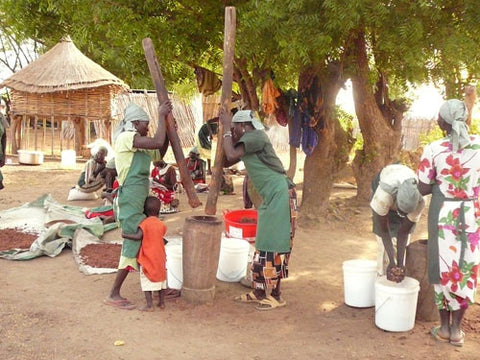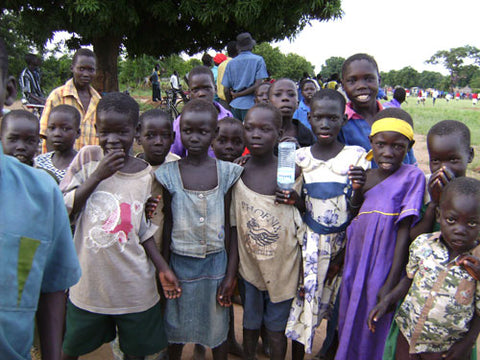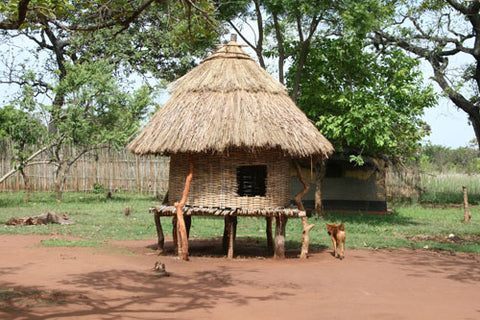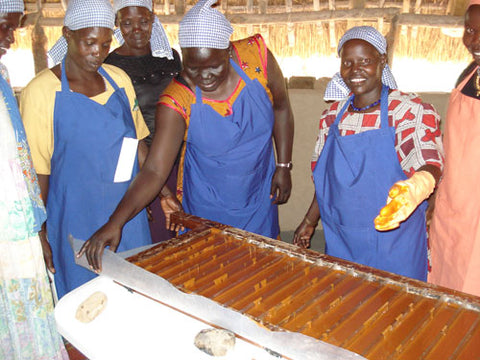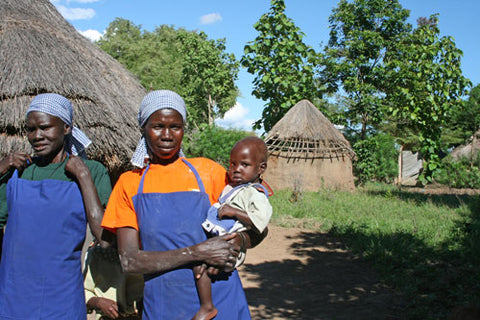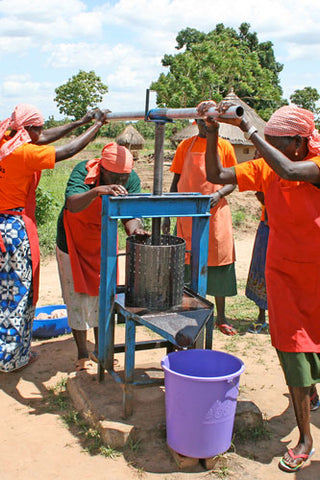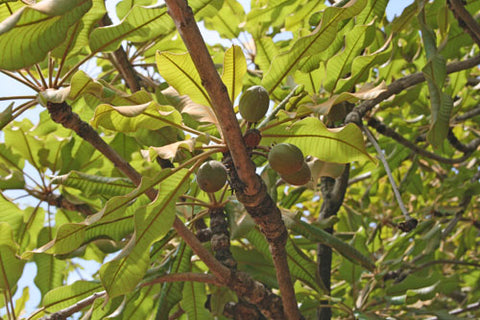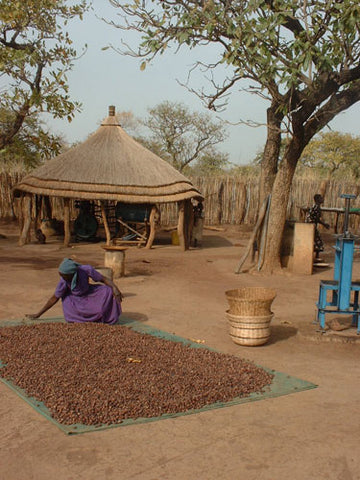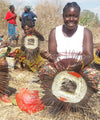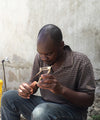In South Sudan, a collective of women make raw, Grade A, virgin, African shea butter by hand using the nuts of the vitellaria paradoxa nilotica tree, which grows only in East Africa.
The women work under the Lulu Works program, which was founded in 2000 by the French non-government organization MEDIC (Medical Emergency and Development International Committee) in response to rampant hunger and need in conflict torn Sudan.
Over the past decade, Lulu Works and its various arms have created an infrastructure for a sustainable shea butter industry for the women of Southern Sudan, ensuring the rights of Sudanese women as the traditional guardians of Sudan's lulu (shea nut) tree. Processing lulu oil is extremely labor-intensive, but with proper storage, lulu oil can be preserved year round for use. Through the careful organization of nut collection sites and oil processing centers, enough lulu oil can be produced in Southern Sudan to meet local demand and to convert surplus oil into marketable skin care products.
The Lulu Tree:
Sudan's Vital Natural Resource
The nilotica variety of shea nut tree (called lulu in Arabic) grows mainly in a narrow band of savannah extending from Senegal to Ethiopia. Lulu trees grow abundantly on the ironstone plateau and the alluvial plains of Southern Sudan. This medium sized deciduous tree rarely exceeds 15m, and is estimated to live between 200 to 300 years, with 15 to 20 years of growth required before fruiting.
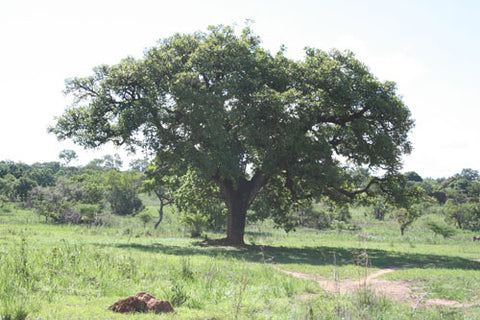
Because the tree's rich bounty of nutritious lulu nuts yields at the exact time of the seasonal hunger, the lulu tree is greatly celebrated in Southern Sudan as a vital natural resource. The economic value of lulu nuts is also extremely high, providing women guardians with income and household food security.
Nilotica vs Paradoxa:
The Advantage of Purity
The vitellaria nilotica variety of
shea butter varies from the better-known paradoxa variety that has been commercially exploited in West Africa for decades. The oil from darker paradoxa nuts has to be bleached and deodorized before processing into skin care products, so the resulting butters lack the untouched purity of butters crafted from nilotica oil.
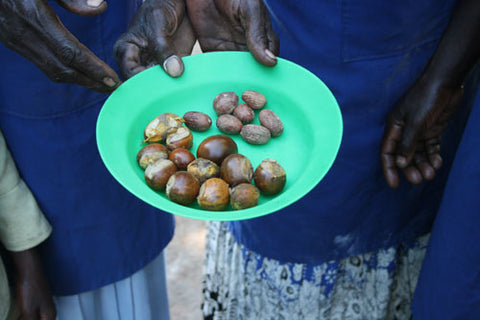
Since nilotica oil has a naturally pure and mild flavor that requires little processing, it has become a highly coveted additive for natural skin and hair care products. Rich in olein, nilotica oil from Sudan is superior in cosmetics and is known in Sudan and around the world for its positive effects on the digestive system, the hair and skin.
The Guardians of Life
Over the past century, the secrets of the
lulu shea nut butter have been unearthed and passed down by Sudanese women, the traditional guardians of the lulu tree. The women share a symbiotic relationship with this life-giving tree, eating the fruit, processing the nuts into oil and enjoying the tree's cool shade. The nutritious oil was particularly important during Sudan's civil war and is still a main source of food security during the yearly dry season.
Turning Nuts into Oil
Wild-crafted, non-certified organic lulu nuts used to create
African shea butter are collected and fully dried, then pounded into a mash using a large mortar and pestle called a funduk. Women push the mash through a hand-powered cold press mill that squeezes the oil from the nuts, retaining the nutritive properties and yielding a clear, lightly scented oil that transforms readily into a creamy butter. The women add beeswax and essential plant oils to convert the lulu oil into naturally pure soaps and lip balms.
Lulu Works: The Company behind the Lulu Life label
In 2005, Lulu Works Ltd., the parent company of the Lulu Life skin care brand, established training projects that teach women better techniques to alleviate the intensive labor process and helped set up processing and nut collection centers. Lulu Works integrates lulu groups working in isolation of each other, using the capacity of the group to give each woman access to otherwise unreachable markets.
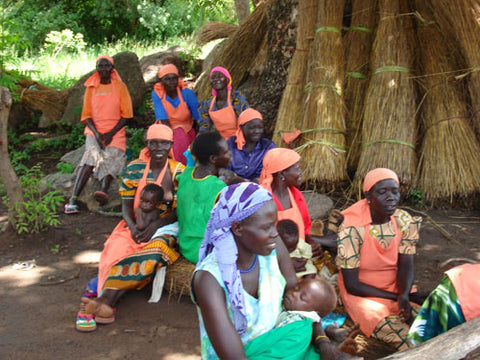
Lulu Life Trust: Profits for the People
The Lulu Life Trust is the financial arm of the Lulu Livelihoods program that ensures that profits from Lulu Life brand products return to the workers at the 40 women-owned-and-operated lulu butter processing centers. As a non-profit trust, Lulu Works sees that fair trade income reaches a total of 800 women in Southern Sudan, helping them maintain a healthy household with money for food, clothing, education and medical care. Sustainable living coupled with a wide variety of productive investments is contributing greatly to the development of the local economy.
A few of the ladies shared their thoughts about working with Lulu Works:
I used to walk all day or all night to get to a market and sell my harvest, for very little money. I didn't even have enough money for clothes or shoes. My children could never go to school. Now all my children go to school. With this work, the women in our village have been bringing a lot more money in the family than the husbands, so much that the husbands now come to beg the group to employ their women.
Rebecca Ukuol
I cannot read or write. I have three children less than 6 years. I used to earn money by making beer and alcohol but now I do not have time to do this. I wanted to do other work that did not mean I was to make drinks. Lulu work pays me money so I can do things for my children. I want to build my own home. I love my work and do it well.
My biggest dream is that all my grandchildren get an education, so that they can get a good job and they can then look after me and I can rest in a good home. I thank Lulu Life for helping me get closer to that dream.
Swahili Modern and the Lulu Life Label
In spring of 2008, Leslie traveled into Sudan to visit several of the Lulu Works
shea butter processing centers. At every location, she was greeted by smiling, dancing, ululating ladies dressed in matching aprons and head wraps. Leslie shared our appreciation for the opportunity to represent Lulu Works in the United States and spent a few moments explaining the part we play in seeing that their skin care products make it to appreciative customers in the U.S.
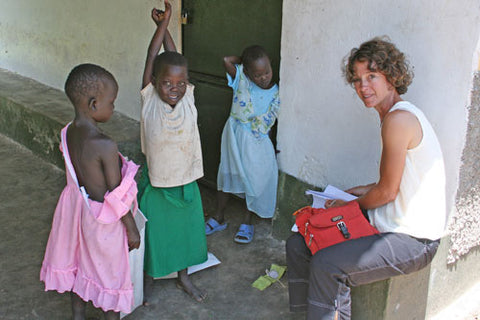
Leslie's journey into the remote reaches of Sudan emphasizes our adherence to fair trade interactions in Africa. Whenever possible, we strive to meet face-to-face with as many of our artisans and producer groups as time allows. The exchange of ideas and goodwill communicated in these meetings can only truly occur during face-to-face interaction, so we believe that every uncomfortable moment spent bumping along unpaved roads under the heat of Sudan's equatorial sun is worth it, hundreds of times over.
Lulu Life in a Nutshell
The Lulu Livelihoods program offers a mutually beneficial way to directly empower the women of South Sudan with fair trade income from the production of
virgin shea butter. By purchasing Lulu Life brand skin care products, you not only treat your skin to some of the best nutrients the earth has to offer, but you also help bring economic stability to Southern Sudan, enabling families to provide their children with an education and a bright future.
Below are more photos for you to enjoy. These images were taken during out last trip to Sudan and reflect the fascinating process of making
shea butter by hand.



